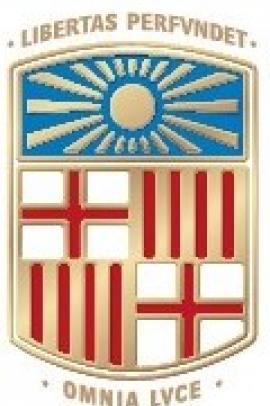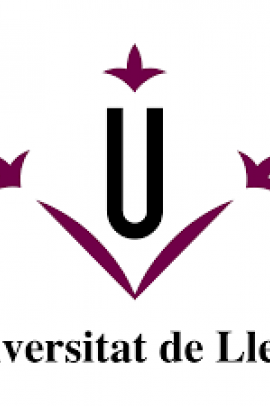Facultat de Ciències Jurídiques de la Universitat Rovira i Virgili (URV)
(Tarragona, Catalonia, Spain)
The conference aims to foster discussion among social scientists about the relations between language and work, including occupations, labor processes and employment conditions.
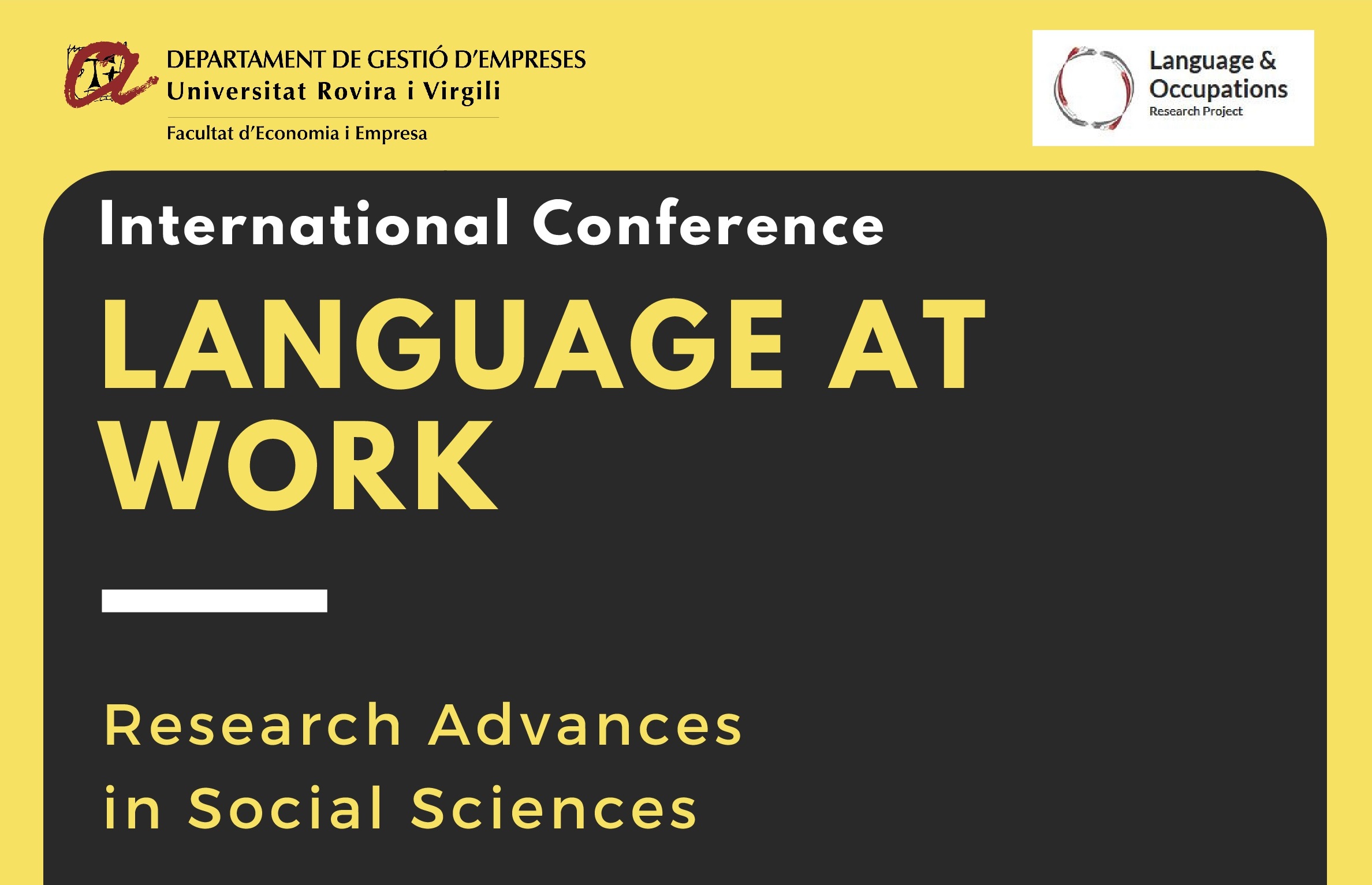
Facultat de Ciències Jurídiques de la Universitat Rovira i Virgili (URV)
(Tarragona, Catalonia, Spain)
The conference aims to foster discussion among social scientists about the relations between language and work, including occupations, labor processes and employment conditions. Within this broad field, the conference will focus on the central role language plays in labor processes. We start from the centrality of language in the information society, since information is linguistically coded and, for a wide range of products and services, language becomes raw material. Language is thus a key component of productivity, employability, wages, and control. First and additional languages, computer languages, numerical systems, scripts or protocols can be approached as today’s working tools that must be mastered by professionals on an everyday basis. Beyond the classical “language industries” whose outputs are books or translations, today’s conversations and texts are produced in a wide range of workplaces where they can be understood as the final product of the labor process.
Adopting an interdisciplinary perspective, the conference will bring together scholars engaged in research on workplace language skills and their implications for broader social and economic concerns, including social and economic inclusion, job security, long-life learning, unionization, gender inequalities, and wage differentials.
Topics:
‐ Defining and measuring language skills related to job performance
‐ Language standardization/agency and production processes
‐ “Linguistic-jobs” and “non-linguistic” jobs
‐ Non-natural languages in the labor market. Technical and numerical languages.
‐ Professions and sectorial language. Jargons, company speak.
‐ Language skills, wages, employment, and employability
‐ Language as raw material, tool, and product
‐ Language, hiring, and promotion
‐ Social and economic implications of language work
Confirmed Keynote Speakers:
|
 |
|

|
|

|
|
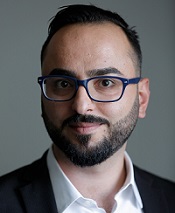
|
|

|
|
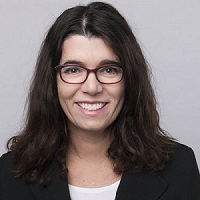
|
|
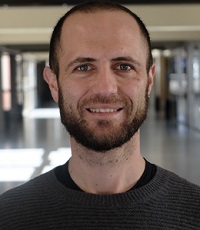
|
Program at a glance:
| Thursday, 7 June 2018 | ||||
|
8:00
8:45
|
Registration, Hall Sala de Graus
|
Friday, 8 June 2018
|
||
|
8:45
9:15
|
Welcome Speeches, (Room Sala de Graus)
|
|
||
|
9:15
10:30
|
Plenary (Room Sala de Graus)
Economic theory and the diffusion of languages
Prof. Florian Coulmas, University of Duisburg-Essen
(Germany)
Language as a corporate asset, Prof. Krishna S. Dhir, University of Hawaii at Hilo (USA)
|
Plenary (Room Sala de Graus)
The literal cost of linguistic assimilation for immigrant minorities, Prof. Orhaan Agirdag, Katholieke Universiteit te Leuven (Belgium)
Not only privilege and exclusion, but also resistance and democratization: The multiple power effects of multilingualism at the workplace, Dr. Claudine Gaibrois, University of Saint Gallen (Switzerland)
|
||
|
10:30
11:00
|
Coffee Break
|
Coffee Break
|
||
|
11:00
12:25
|
Parallel Session 1 in Spanish Language (Room 420)
Validation of labour language intensity scale (ILT)Antoni Vidal-Suñé, M. Belén López- Panisello,Universitat Rovira i Virgili (Spain)
The importance of the basque language in anthropological research in the Basque Autonomous Community Katarzyna Mirgos University of Gdańsk (Poland)
Classification of labour occupations through language skills using artificial neural networks analysisM. Carme Molina Cobo; M. Teresa Sorrosal Forradellas; Antoni Vidal- Suñé Universitat Rovira i Virgili (Spain)
|
Parallel Session 2 (Room 423)
Water cooler talk: conversations at work and conversational work Lisandre Labrecque-Lebeau, CIUSSS Centre-sud-de-l’île-de-Montréal (Canada)
The work of being an informed consumer: Is there a digital divide in the case of responsible consumption? Eleni Papaoikonomou; Matias Carlos Ginieis Iribarren; Rafael Böcker Zavaro
Universitat Rovira i Virgili (Spain)
Language and witchcraft as a trade: Insights from Machakos County, Kenya Purity M. Nthiga; Gatitu Kiguru; Phyllis W. Mwangi; Caryn KimuyuKenyatta University (Kenya)
|
Parallel Session 6 (Room 420)
Language-Intensity-Similarity, and -Competences, and the cross-border labour market in Europe
Roman Szul, University of Warsaw (Poland)
The Welsh National Sabbatical Scheme: Building and strengthening the Welsh language capacity of the education workforce in Wales
Christina Marie Wagoner
Cardiff University (United Kingdom)
Immigrants’ educational credentials leading to employment outcomes: The role played by language skills
Javier Mato Díaz; María Miyar Busto; Rodolfo Gutiérrez Palacio
Universidad de Oviedo and UNED (Spain)
|
Parallel Session 7 (Room 423)
Two worlds of scripts: Call Centres and public services. The case of gender violence hotlines in Spain
Amado Alarcon; Blanca Deusdad; Tinka Schubert
Universitat Rovira i Virgili (Spain)
Commercial multilingualism in migrant businesses: Neoliberal language polices, commodification of ‘non-standardness’ and linguistic exploitation
Maria Sabaté-Dalmau, Universitat de Lleida (Catalonia, Spain)
The importance of being employable. Construction of membership category ‘Employable Graduate’ in the MOOC unlocking your employability
Katarzyna Aleksiejuk
Graduate of the University of Edinburgh, currently unaffiliated (United Kingdom)
|
|
12:30
13:15
|
Plenary (Room Sala de Graus)
We’re a small team pretending to be a big one’; negotiating collective identities at work, Prof. Jo Angouri, University of Warwick (United Kingdom)
|
Plenary (Room Sala de Graus)
Language Challenges in the Workplace: The Soviet Diaspora in the US Innovation Economy, Prof. Sheila M. Puffer,Northeastern University (USA)
|
||
|
|
Free time for lunch
|
Free time for lunch
|
||
|
15:00
16:25
|
Session 3 (Room 423)
The language of algorithms and the changes in police work
Natalie P. Byfield, St. John’s University (USA)
A Pluri-Ethno-Linguistic fragmentation index
Stéphanie Cassilde; Kelly Labart, CEHD (Belgium); FERDI (France)
Political correctness and linguistic creativity on the job market. How much do they
(mis)inform?
Ilona Delekta, University of Silesia (Poland)
|
Parallel Session 8 (Room 420)
Integrating corpus-based tools in translators’ work environment: Cognitive and professional implications
Sandrine Peraldi, University College Dublin (Ireland)
Translation management and digitalization in the Swiss Federal Government
Till Burckhardt, University of Geneva (Switzerland)
State Language in State Administration: Language Policy in Georgia and Real Language Practices
Tamari Lomtadze, Akaki Tsereteli State University Kutaisi (Georgia)
Language used at work: a comparative study by countries and gender through a language intensity index
Teresa Corbella, Amado Alarcón, Universitat Rovira i Virgili (Spain)
|
Parallel Session 9 (Room 423)
Linguistic corpus of names of professions as applied source for job searching: A technical challenge
Sandrine Fuentes; Hugo Valenzuela-Garcia
Universitat Autònoma de Barcelona (Spain)
Preliminary meta-analysis on the linguistic validity of self-reporting
Ester Torres-Simon
Universitat Rovira i Virgili (Spain)
Migrants and the EU 2020 strategy: Towards occupational inclusion
Nune Ayvazyan
Universitat Rovira i Virgili (Spain)
|
|
|
16:30 17:10
|
Plenary (Room Sala de Graus)
Local languages in the labour market: The case of Catalan, Prof. Antonio Di Paolo (Universitat de Barcelona, Spain)
|
16:30-17:00 Closure (Room Sala de Graus)
&
17:00-45 Farewell Cocktail
|
||
|
17:15 18:45
|
Parallel Session 4 (Room 420)
Technics of domination on everyday situations of dialogue
Rahil Ashenagar
University of Science & Culture (Iran)
Mohammadreza Kolahi
Institution for cultural and social studies (ISCS) (Iran)
Foreign language knowledge: A resource or a barrier for economic integration?
Josep Ubalde; Cristina Morales; Amado Alarcón
Universitat Rovira i Virgili (Spain); University of Texas at El Paso (USA)
Languages at work in the Basque Autonomous Community
Karin van der Worp
University of the Basque Country, UPV/EHU (Spain)
|
Parallel Session 5 (Room 423)
Communication skills in the workplace: The Kenyan Graduates’ achilles heel?
Phyllis W. Mwangi; Purity M. Nthiga; Gatitu Kiguru
Kenyatta University (Kenya)
Foreign languages and employability in Europe
Daniele Mazzacani Libera Università di Bolzano (Italia)
What key competences the occupations have?
Catherine S. Capelo & M. Angeles Serrano
Universitat Rovira i Virgili (Spain)
|
18:00-19:00. RecerCaixa/MEC Project Meeting.
(Room Sala de Graus)
|
|
|
18:45
|
Guided tour to the city of Tarragona
|
|
||
|
21:15
|
Dinner. At Restaurant Palau del Baró.
|
|
||
Abstracts submission and registration:
Abstracts proposals should be sent to: amado.alarcon@urv.cat. The abstracts should be at least 300 words in length with four keywords and must include the name and affiliation of the authors. Abstracts should in English, alongside other versions if appropriate. Presentations can be in other languages than English, but presenters should provide a summary in English to the organizers and the audience. The proposals will be evaluated by the scientific committee. Accepted contributions will be allocated time slots of 25 minutes for presentation.
- Abstract submission deadline: March 15th 2018
- Notification of abstract evaluation: April 15th 2018
- Presenter registration: May 1st 2018
Conference registration:
On-line conference registration is now open. Please click on the following link to be redirected to the on-line registration service:
http://wwwa.fundacio.urv.cat/congressos/language-at-work-conference/registration
- Registration Fees:
The inscription fees include program folder and coffee breaks.
General price: 100 €
Reduced price (for students and members of supporting institutions): 70 €
- Grants:
8 registration grants and 4 travel grants will be awarded among accepted authors. Accepted authors should send a Statement of need between April 16th and 20th 2018 to: amado.alarcon@urv.cat. Grants will be allocated before May 1st 2018.
Scientific Committee Members: Amado Alarcón (Universitat Rovira i Virgili); Till Burckhardt (Université de Gèneve, Swicherland); Stéphanie Cassilde (Centre d'Études en Habitat Durable, Belgic); Florian Coulmas (Duisburg Essen University, Germany); Antonio Di Paolo (Universitat de Barcelona, Spain); Federico Farini (Middlesex University in London, UK); Keiji Fujiyoshi (Otemon Gakuin University, Japan); Michele Gazzola (Humboldt-Universität zu Berlin, Germany); Nadezhda Georgieva-Stankova (Trakia University, Bulgaria); Maria Guadalupe González (Universidad Pedagógica Nacional, Mexico); Cecilio Lapresta (Universitat de Lleida, Spain); Josiah McC Heyman (University of Texas at El Paso, USA); Maria Cristina Morales (University of Texas at El Paso, USA); Anthony David Pym (Universitat Rovira i Virgili, Spain); Roland Terborg (Universidad Nacional Autónoma de México, Mexico); Ester Torres (Universitat Rovira i Virgili, Spain); Trinidad Valle (Fordham University, USA); Antoni Vidal-Suñé (Universitat Rovira i Virgili); Johanna Woydack (University of Vienna, Austria).
Local Organizing Committee: Amado Alarcón (URV), Antoni Vidal-Suñé (URV), Tinka Tabea Schubert (URV), Teresa Sorrosal (URV), Nune Ayvazyan (URV), Maria Jesús Muiños (URV), Teresa Corbella (URV), M. Carmen Molina (URV), Belén López (URV), Josep Ubalde (URV), Carla Aguilar (URV), Mar Joanpere (URV, Technical secretary)
Supporting Institutions:
 |
 |
||

|

|

|
|

 ,
, 


